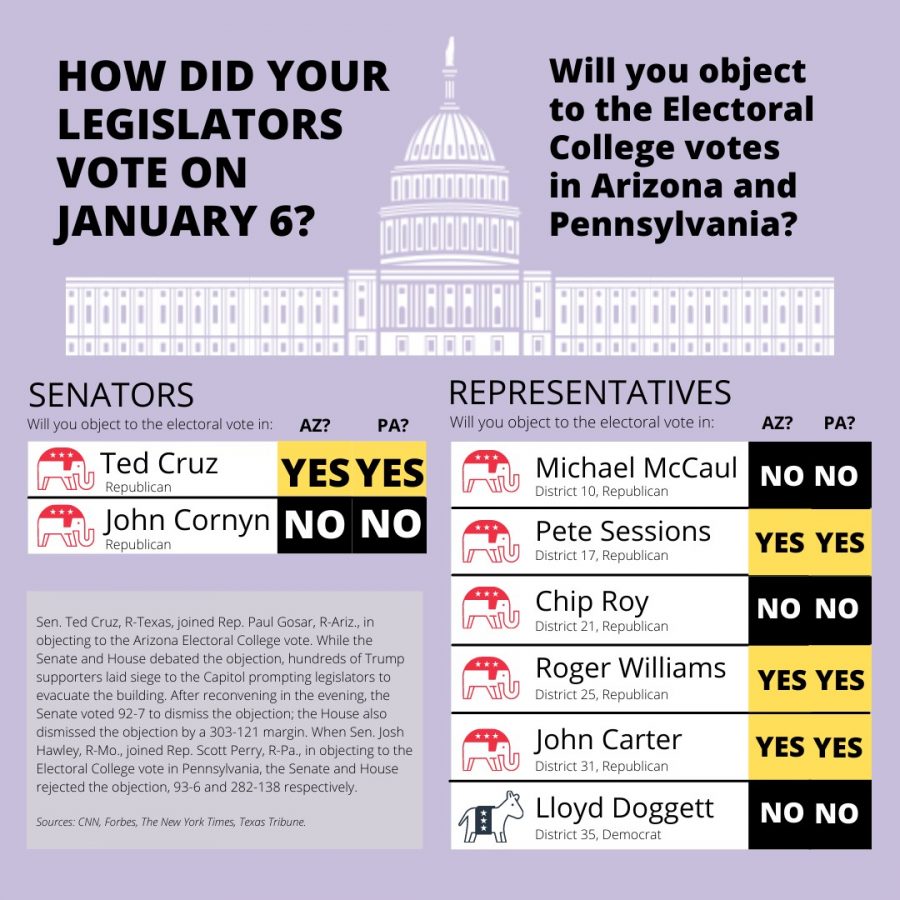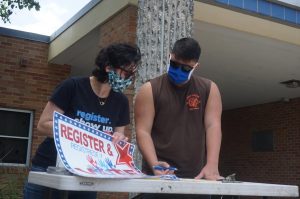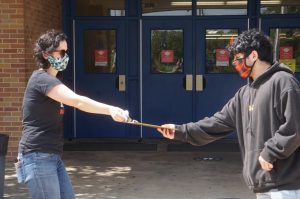How did your legislators respond to Jan. 6 events?
All of them condemned the attack on the Capitol, but on the issue that led to the insurrection, they were evenly divided
January 10, 2021
Members of The Senate and House of Representatives gathered on Wednesday to certify the Electoral College votes of the 2020 election. The certification process was interrupted, however, when a mob of Trump supporters stormed the Capitol causing the legislators to evacuate the building. The insurrection has led to the death of five people and raised questions about how such an assault on the Capitol could happen.
When the joint session reconvened, both the House and Senate eventually voted to confirm President Elect Joe Biden and Vice President Elect Kamala Harris as the next president and vice president of the United States.

This graph shows how Texas senators and representatives for Austin’s various districts voted as some Republican senators and representatives objected to the certification of the Electoral College voting in Arizona and Pennsylvania.
One Austin-area representative who chose to object to the Electoral College certification in Arizona and Pennsylvania is Republican District 17 U.S. Rep. Pete Sessions.
“America needs to be one of rule of law and of instant replay with a close call.” Sessions said in a tweet. “If we neglect to challenge the states in question, whomever gets the presidency will be seen in a different light. It is in everyone’s best interest to constitutionally verify the result.”
Objections were seen by members of both The House and The Senate, including Sen. Ted Cruz, R-Texas, who led the charge for objection during the certification process by singing the objection to the Arizona objections. In order for an objection to be considered, it had to be presented in a letter signed by at least one representative and one senator.
“What I was doing, and what the other senators were doing, is what we were elected to do — debating matters of great importance in the chamber of the United States Senate,” Cruz said in an interview with CBS. “I joined with 11 other senators, and we proposed to the Senate that Congress should appoint an electoral commission to conduct an emergency 10-day audit of the election results of this last election.”
My statement on why I plan to certify: pic.twitter.com/yNGu6vyDmY
— Michael McCaul (@RepMcCaul) January 6, 2021
The 11 objecting Republican senators that Cruz mentioned initially planned to object to the certification of the electoral votes, but that number dropped to eight after Kelly Loeffler of Georgia, Steve Daines of Montana and Mike Braun of Indiana shifted their stance after the insurrection on the Capitol.
The siege of the Capitol caused legislators to call out the violent behavior of the protestors who invaded the building.
“I am disgusted by the actions of those who came to our nation’s capital with violent intentions,” said U.S. Rep. Roger Williams, R-Texas District 25, in a tweet responding to the attacks on the Capitol. “This behavior is an extraordinary stain on our democracy.”
While he condemned the attack on the Capitol, Williams still objected to the certification of the votes in Arizona and Pennsylvania.
“Faith in our system must be restored and Americans must be confident that their vote matters and only lawful votes will be counted,” Williams said in a press statement released the day after the attacks. “[Jan. 6] was a sad day in our nation’s history, but a solemn reminder that our country will not falter and will not fail.”
The Constitution gives our citizens the right to peacefully assemble. It does not give them the right to destroy property and commit violence against our first responders; Capitol Police and law enforcement have our full support. (1/2)
— Rep. Roger Williams (@RepRWilliams) January 6, 2021
Like Williams, U.S. Rep. John Carter, R-Texas District 31, objected to the vote count when the joint session of Congress reconvened several hours later, but he also denounced the violent action upon the Capitol.
“Peaceful protests are a fundamental right in the United States, but violence is absolutely unacceptable,” Carter said in a tweet. “Respect our law enforcement officers’ orders. Vacate the Capitol and let the process unfold.”
Other legislators from Texas called on the President to condemn the criminal actions of protestors and lead the country toward peace and order.
“Mr. President, get to a microphone immediately and establish calm and order. Now,” U.S. Rep. Chip Roy, R-Texas District 21, said in a tweet, “and work with Capitol Police to secure the Capitol. It’s the last thing you’ll do that matters as President.”
Even before Wednesday’s insurrection, Roy had committed to certifying the election results on Wednesday.
“I will not be voting to reject the electors,” Roy reiterated in a speech he gave after Congress reconvened. “That vote may sign my political death warrant. But so be it. I swore an oath to uphold the Constitution of the United States — and I will not bend its words into contortions for political expediency and then claim I am honoring that oath.”
We are divided about even “life, liberty and the pursuit of happiness.”
The words which used to bind us together, now — at times — tear us apart because we disagree about what they even mean.
But at the heart of our path forward lies the essence of our republic.
Full speech: pic.twitter.com/lRt4VoXQtY
— Rep. Chip Roy (@RepChipRoy) January 7, 2021
In his speech after the insurrection, Chip Roy rejected Democratic policies and Republican objections to certifying the Electoral College vote.
When the certification process reconvened, more Texas Republicans voted in favor of the objections in both Pennsylvania and Arizona, but a significant number voted against them.
“If Congress chooses to ignore or second-guess the electoral votes chosen by the States, it will set a dangerous precedent that could call into question the very institution of our democracy.” Republican U.S. Rep. Michael McCaul, R-Texas District 10, said in a tweet explaining why he voted to certify the election.
Texas Republican Senator John Cornyn also voted against the objections raised.
“As a former judge, I view this process with the same impartial, evidence-based decision-making as I did my job on the bench,” Cornyn wrote in a letter to Texans explaining his stance on the certification of the electoral votes. “So, unless substantial, new evidence is presented during the challenges to each state’s ballots, I will not object to the certification of that state’s election results based on unproven allegations.”
A shocking and tragic day for America—the natural outcome of Trump feeding his supporters a steady diet of lies and spurring them on to block formal recognition of his clear defeat. We will not throw out millions of legal votes or throw out our freedom.
— Lloyd Doggett (@RepLloydDoggett) January 6, 2021
Despite objections, the Senate voted overwhelmingly to certify the Electoral College vote. The vote was decisive, but closer in the House where a greater percentage of Republicans had objected. The electoral vote count, an event that is symbolic of American democracy, confirmed the outcome of the 2020 election despite attempts to disrupt the proceedings.
“I’ve been through this process several times.” U.S. Rep. Lloyd Doggett, D-Texas District 35, said in an interview with KVUE. “Normally, it involves no action at all, just a routine ministerial action. It is very troubling where we are.”






